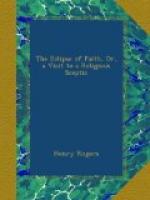You remember what hopes we both formed of his youth, from the promise alike of his heart and of his intellect, How fondly we predicted a career of future usefulness to others, and honor and happiness to himself! You know how often I used to compare him, for the silent ease with which he mastered difficult subjects, and the versatility with which he turned his mind to the most opposite pursuits, to the youthful Theaetetus, as described in Plato’s dialogue the movements of whose mind Theodorus compares to the “noiseless flow of oil” from the flask.
He was just fourteen and a half when you left England; he is now, therefore, nearly twenty-nine. He left me four years ago, when he was just twenty-five,—about a year after the termination of his college course, which you know was honorable to him, and gratifying to me. He then went to spend a year, or a year and a half, as he supposed, in Germany. His stay (he was not all the time in Germany, however) was prolonged for more than three years. In the letters which I received from him, and which gradually became more rare and more brief, there was (without one symptom of decay of personal affection) a certain air of gradually increasing constraint, in relation to the subject which I knew and felt to be all-important. Alas! my prophetic soul took it aright; this constraint was the faint penumbra of a disastrous eclipse indeed! He was not, as so many profess to be, convinced by any particular book (as that of Strauss, for example) that the history of Christianity is false; nay, he declares that he is not convinced of that even now; he is a genuine sceptic, and is the subject, he says, of invincible doubts. Those doubts have extended at length to the whole field of theology, and are due principally, as he himself has owned, to the spectacle of the interminable controversies which (turn where he would) occupied the mind of Germany. Even when he returned home he does not appear to have finally abandoned the notion of the possibility of constructing some religious system in the place of Christianity;— this, as he affirms, is a later conviction formed upon him by examining the systems of such men as have attempted the solution of the problem. He declares the result wholly unsatisfactory; that, sceptical as he was and is with regard to the truth of Christianity, he is not even sceptical with regard to these theories; and he declares that if ’the undoubtedly powerful minds which have framed them have so signally failed in removing his doubts, and affording him a rock to stand upon, he cannot prevail upon himself to struggle further.
And so, instead of stopping at any of those miserable road-side inns between Christianity and scepticism, through whose ragged windows all the winds of heaven are blowing, and whose gaudy “signs” assure us there is “good entertainment within for man and beast,”— whereas it is only for the latter,—Harrington still travelled on in hopes of finding some better shelter, and now, in the dark night, and a night of tempest too, finds himself on the open heath. To employ his own words, “he could not rest contented with one-sided theories or inconsequential reasonings, and has pursued the argument to its logical termination.” He is ill at ease in mind, I hear, and not in robust health; and I am just going to visit him.




